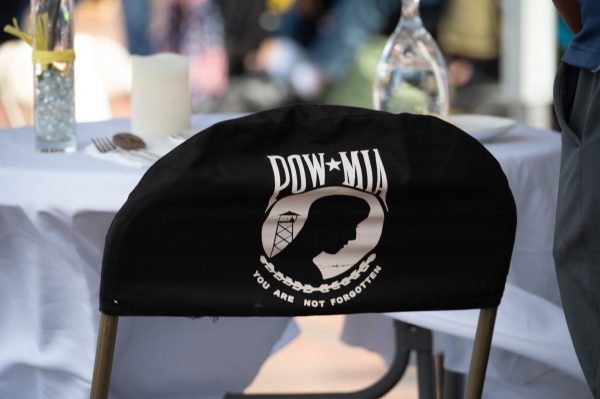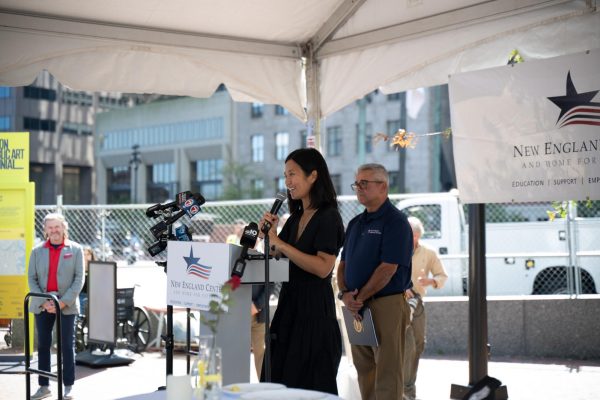Earlier this month, camaraderie, selflessness, and inspiration were on display during the 2025 Prisoner of War and Missing in Action Recognition Day at City Hall Plaza.
The third Friday of September has been nationally recognized as the official day of remembrance for POW/MIA veterans since 1979. Boston began holding its own local ceremony that same year and has hosted the event at City Hall for the last eight years.¬Ý
In recognition, many businesses in Boston flew the widely recognizable black and white POW/MIA flag that has been in use since the ‘70s; however, the significance of the flag is commonly overlooked.
In the United States, there are over 80,000 missing American service personnel accumulated from previous conflicts, including but not limited to World War II, the Korean War, and the Vietnam War. Those who have not come home from their service are considered to have made the ultimate sacrifice: their lives. The flag represents lost soldiers who were tortured and killed in war. Today, people fly the flag because they believe it is their civic duty to honor and serve veterans.¬Ý

For the fourth year in a row, Boston‚Äôs POW/MIA Recognition Day Ceremony was combined with the 2025 Greater Boston Stand Down for Veterans event hosted by The New England Center and Home for Veterans, an organization seeking to help homeless veterans and those struggling with the transition to civilian life. Over 400 veterans receive permanent housing through the organization yearly, and over 250 veterans stay the night on any given day at their building across from City Hall.¬Ý
The event featured over 70 tents, with each representing agencies, non-profits, and corporations, both local and federal, that provide different services to veterans in need. Some workers were employees of the organizations they were representing, such as the Volunteers of America and NECHV, but many others were volunteers who signed up for the event because they were moved by the cause.¬Ý
Andy McCawley, the president of NECHV, said that the goal of Stand Down is to ‚Äúprovide services that are available every day‚Äù and remind veterans of their value. He made sure to thank every volunteer for their help, crediting them for the success of the ceremony.¬Ý
‚ÄúEach and every one of you is a key participant,‚Äù said McCawley.¬Ý
Among the tents were organizations providing legal advice, employment training, free clothing items, and even a barber where veterans could get their hair cut professionally. There were also multiple medical tents that provided healthcare services such as blood pressure checks, toxin screenings, pharmaceutical needs, and free consultations from primary care doctors and dentists.¬Ý
Some tents focused on specific groups of veterans, including a group that represented the Jewish War Veterans of the United States of America, the country‚Äôs oldest military organization, formed in 1896.¬Ý
‚ÄúMost veterans do not talk about their service,‚Äù said Harvey Weiner, a member of 25 years and a Vietnam War veteran. As Weiner spoke, he handed out socks to veterans in need‚Äîa small pair and a large pair to overlap each other in the winter.¬Ý
Weiner explained that events like these are very important to him because of the awareness they raise and the care veterans receive from civilians, which he says is not always common.¬Ý
‚ÄúPeople who are most interested in veterans are other veterans,‚Äù said Weiner.¬Ý

A tent for women, set up and run by female volunteers across various organizations,¬Ý provided free clothes for female veterans and male veterans‚Äô wives, countless everyday hygiene products, and information about accessible feminine services. The tent was established in 2002 and provides for an average of 70-80 women per year.¬Ý
Carolyn Mason-Wholley, who has been helping run the station for 15 years, hopes that younger female veterans will come to them in the future. She said that many female veterans feel isolated from their community when they return from service due to sexism.
“The [female] population would really love to know that … there is a safe space [for them],” Mason-Wholley said.
On the federal level, veterans‚Äô services have been cut by President Donald Trump‚Äôs administration. Cuts to the Department of Veterans Affairs last Spring included the termination of 83,000 jobs, which consequently affects healthcare access, mental health services, and research funds for veterans’ issues.¬Ý¬Ý
Councilman Ed Flynn, who served for 24 years, told the crowd that there must be an effort to push back against the changes.
‚ÄúWe have to work together to fight against [Trump],‚Äù said Flynn. ‚ÄúIt‚Äôs our job as elected officials to advocate to veterans, even when it‚Äôs popular or not popular.‚Äù¬Ý
Despite these setbacks, Boston is continuing to pursue various initiatives on a local level. The city created the Boston’s Way Home initiative in 2015, in which the government works with local non-profits and other organizations to raise money and awareness for vulnerable veterans.
“All of our veterans have served, and now it is our honor to serve them and their families,” Mayor Michelle Wu said in a speech, calling upon the government and all Bostonians to help veterans.
Speakers also encouraged attendees to volunteer their time. Many local organizations are currently accepting volunteers who want to help veterans, including NECHV, the VA, and Home Base, according to volunteers from their stations.¬Ý
“Massachusetts leads the nation [and] sets a precedent in helping veterans,” said McCawley. “Boston is the best place to live for veterans because of your leadership and support, not just today, but every day.”